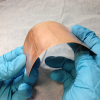Science & Technology
- <p>Oil and gas operations in the United States produce about 21 billion barrels of wastewater per year. The saltiness of the water and the organic contaminants it contains have traditionally made treatment difficult and expensive. Engineers at the University of Colorado Boulder have invented a simpler process that can simultaneously remove both salts and organic contaminants from the wastewater, all while producing additional energy.</p>
- Making more monuments: Just like modern cities, ancient settlements got more productive as they grew<p class="p1">Living in bigger, denser settlements allowed the inhabitants of ancient cities to be more productive, just as is true for modern urbanites, according to a new study by scientists at the University of Colorado Boulder and the Santa Fe Institute.</p>
<p class="p1">As modern cities grow, they obey certain rules. As the population increases, for example, the settled area becomes denser instead of sprawling outward. This allows people to live closer together, use infrastructure more intensively, interact more frequently, and as a result, produce more per person.</p> - <p>Two University of Colorado Boulder programs that teach kids to code have received Google RISE Awards to support their efforts to attract girls and underrepresented minorities to computer science.</p>
<p>The two programs are the Scalable Game Design project, which hooks kids on coding by empowering them to build their own video games, and AspireIT, which connects high school and college women with K-12 girls interested in computing.</p>  <p>Kelvin Thermal Technologies and the University of Colorado have executed an exclusive license agreement that will allow the company to develop and market thermal management technologies that could enable the development of ultra-thin and flexible smartphones, wearable electronics and other commercial and military systems.</p>
<p>Kelvin Thermal Technologies and the University of Colorado have executed an exclusive license agreement that will allow the company to develop and market thermal management technologies that could enable the development of ultra-thin and flexible smartphones, wearable electronics and other commercial and military systems.</p> <p class="p1">A new study finds that small differences in institutional prestige have an enormous impact on the likelihood that a person who graduates with a doctoral degree will land a coveted faculty job.</p>
<p class="p1">A new study finds that small differences in institutional prestige have an enormous impact on the likelihood that a person who graduates with a doctoral degree will land a coveted faculty job.</p>
<p class="p1">The advantage of alma mater prestige in finding a job is so great that it cannot be explained solely by a difference in educational quality between the universities, according to the study, led by the University of Colorado Boulder and published today in the journal <i>Science Advances.</i></p> <p>The University of Colorado Boulder has announced Thomas Krannawitter, Ph.D., as a finalist for the position of Visiting Scholar in Conservative Thought and Policy for the 2015-16 academic year. Krannawitter will visit the CU-Boulder campus and give a talk titled “The Problem of Slavery in the American Founding.” He will explore what the existence of slavery in the early days of the United States, and efforts made to end it, tell us today about the American character.</p>
<p>The University of Colorado Boulder has announced Thomas Krannawitter, Ph.D., as a finalist for the position of Visiting Scholar in Conservative Thought and Policy for the 2015-16 academic year. Krannawitter will visit the CU-Boulder campus and give a talk titled “The Problem of Slavery in the American Founding.” He will explore what the existence of slavery in the early days of the United States, and efforts made to end it, tell us today about the American character.</p>- <p>Sea-level rise may not be eating away at Colorado’s borders, but climate change exposes other critical vulnerabilities in the state, according to a new report. Rising temperatures likely will take a toll on cattle and crops, for example, and could more often leave junior water rights holders with little water and few options.</p>
- <p>A research team led by the University of Colorado Boulder has discovered a mechanism in the brain that is key to making cocaine seem pleasurable, a finding that could lead to a drug treatment for fighting addiction.</p>
<p>The findings build on past research also involving CU-Boulder that found the same mechanism in the brain also interacts with heroin, oxycodone, morphine and other opioid drugs to amplify their addictiveness. The latest study suggests that the mechanism plays a key role in the addictiveness of many abused drugs, possibly including methamphetamine and alcohol.</p>  <p>Up for a romantic Valentine’s Day evening? Then head to the University of Colorado Boulder’s Fiske Planetarium to <em>Relativity for Lovers – A Valentine’s Day Among the Stars</em>, for music, film and a talk on the genius of Albert Einstein.</p>
<p>Up for a romantic Valentine’s Day evening? Then head to the University of Colorado Boulder’s Fiske Planetarium to <em>Relativity for Lovers – A Valentine’s Day Among the Stars</em>, for music, film and a talk on the genius of Albert Einstein.</p>- <p>NASA’s fallen astronauts, including University of Colorado Boulder alumni Ellison Onizuka and Kalpana Chawla, who died in space shuttle accidents 17 years apart, will be remembered both on campus and in a special NASA online tribute this week.</p>


